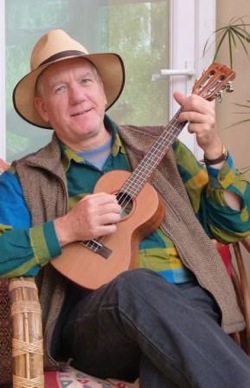 Due to the increasing popularity that the instrument has enjoyed in recent years, RGT has announced that graded exams will now be offered starting with the Winter 2014 exam session.
Due to the increasing popularity that the instrument has enjoyed in recent years, RGT has announced that graded exams will now be offered starting with the Winter 2014 exam session.
As part of the development of these exams and books, RGT reached out to veteran players and teachers for their insight into the best way to teach and test ukulele, including Jon Bennett.
We recently caught up with Oxford-based uke performer and RGT uke teacher Jon Bennett to talk about the uke’s recent jump in popularity, RGT’s new uke exams, and his advice for newcomers to the instrument.
******
RGT: What drew you to learning to play, then teach and perform, the ukulele?
Jon Bennett: I was initially dragged kicking and screaming into ukulele playing and teaching because – perhaps like many of the uninitiated – I didn’t consider it to be a ‘serious’ instrument.
I have headed the band Moonrakers for some years and am a reasonably good guitar and bouzouki player.
I wasn’t looking for yet another instrument to play, but a few years ago the organizers of the annual Bunkfest in Wallingford asked me to run a guitar workshop and, as an afterthought, they wondered if I could also start a ukulele class.
I boldly said, “Yes, of course,” then quickly bought a ukulele and learned how to play it myself.
The ‘bug’ soon got under my skin as I began to appreciate that there was more to this instrument than you might think.
Also, as luthiers across the globe were catching up with its exponential popularity, the quality of the instruments improved.
Once I got my hands on a Kanile’a ukulele made from a beautiful Koa wood, the sound was sufficiently seductive to lead me into a whole new and exciting repertoire.
RGT: You were recently involved with the RGT Uke Exam Books. How did you become involved with this project, and how do you see the books fitting into the RGT catalogue?
Jon Bennett: I’d already been teaching the RGT guitar course up to Grade 8, and I emailed the office to ask if they’d at all be interested in producing something for ukulele.
They replied saying it was already underway and would I like to help in the development of the syllabus.
In my workshops and individual lessons I found that a number of students want to be stretched beyond simply strumming three chords.
When I show them finger-picking and jazz chords it opens a host of new possibilities, and I feel that the RGT course, though very new, will help meet this emerging demand for something extra.
Most importantly, the RGT course presents both a structure and a reward for perseverance.
RGT: As a veteran of the UK uke scene, have you seen a rise in popularity with the instrument lately?
Jon Bennett: There has been an extraordinary growth in ukulele social sessions over the last few years.
It’s partly because the instrument appeals especially to adults who may not have mastered an instrument in their early years but see this within their grasp.
In a short time you can be playing in an ensemble and, of course, can accompany a group song.
In an increasingly isolationist culture, we yearn for activities that re-establish and reinforce community spirit.
At the same time, a certain number of people want to push themselves a little further musically, and perhaps challenge themselves to do a solo song or instrumental; this is where the teacher can help.
RGT: Tell us about the various uke festivals you are involved in, and how people can find out more about participating in these festivals.
Jon Bennett: I run annual residential ukulele workshop weekends, from beginners to advanced, at Halsway Manor, along with player and singer Sara Spade and members of my band, Moonrakers.
I also run workshops at the Towersey and Bunkfest festivals; in fact, this year at Bunkfest, attended by about 10,000 people, we had a 40-minute spot on the main stage as a workshop showcase.
I’m now looking forward to developing more residential workshops in the Oxfordshire area in the coming years.
RGT: You have recorded a number of video lessons for YouTube. Do you feel that maintaining an online presence is essential for guitar and uke teachers these days?
Jon Bennett: To maintain an interest in what services I provide, I have a website with a host of instructional videos all of which are also on my YouTube channel.
Of course, one is entering an already crowded arena, but YouTube is the first stop for many aspiring players so the more profile you can establish there, the better.
Some teachers complain that we are giving away too much free instruction, but there’s no evidence that this dissuades people from taking individual lessons.
On the contrary, it might just encourage a casual observer to also give it a try.
RGT: Do you have any advice for students just picking up the uke for the first time, and for teachers wanted to getting into teaching uke for the first time?
Jon Bennett: Three essential pieces of advice: first, don’t bother with a really cheap instrument.
It may be sparkling purple, but it will be badly set up and impossible to tune.
You’ll need to invest about £80-£100 for a decent starter instrument.
Second, get yourself a good teacher at the outset, if for no other reason than to avoid getting into bad playing habits.
It’s so much easier to learn something than to unlearn it.
Third, don’t watch Jake Shimabukuro on YouTube and give up immediately.
Be comfortable taking it at your own pace and watching how far you can go in a relatively short space of time.
